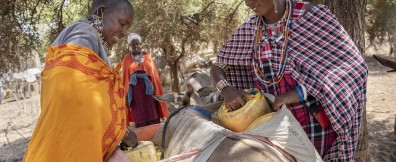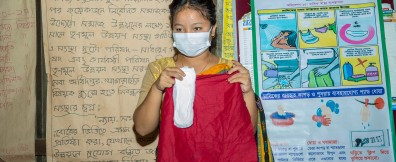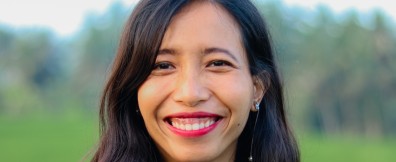More equality for women
Being responsible for water, but not having a say. It is a reality for many women. The unequal treatment of women and girls ensures that insufficient priority is given to solving the water crisis. And it leads to facilities that are not safe or women friendly. Competition for scarce water is increasing due to the climate crisis.
This calls for a stronger voice for women. Their involvement and leadership are essential for real solutions. And for equal opportunities for women and girls.
Fact:
Less than 25 percent of all countries specifically mention women's participation in rural sanitation or water management in policies or laws
In less than 10% of all countries, the community is highly involved in water and sanitation decision-making
Current progress on WASH (Water, Sanitation and Hygiene) needs to be accelerated more than four times to achieve water and sanitation for all by 2030 (Sustainable Development Goal 6)
What is Simavi doing to ensure that women have more access to knowledge, resources and power?
- Simavi works together with policy makers at all levels to ensure decisions and laws are women-friendly.
- We work with local mentors to teach about health and equity. This way we can reach many people and bring about long-term change.
- We ensure that women are aware of their rights by encouraging women to organise and express themselves.
- In our projects we place a lot of emphasis on economic empowerment and entrepreneurship so that women can be economically independent. This enables women to use services and products in the field of water, sanitation and hygiene. And to make their own decisions.
- We involve men and other stakeholders to treat women equally and support them in their economic empowerment. We do not do this ourselves as a Dutch organisation, but with the help of dozens of local partner organisations, who know exactly which methods are best suited to the environment.

Make Africa Strategy a real starting point for an equal relationship

Menstrual health: crucial for achieving the SDGs

So much more than menstrual pads: how Tungga Dewi co-founded a FemTech startup Perfect Fit
Programmes
Our Lives, Our Health, Our Futures
Promote gender equality and empower women and girls in an area of conflict and patriarchal social structures by working with schools and in communities.
WASH SDG
The goal of the WASH SDG programme was to sustainably improve access to, and use of, safe drinking water for at least 450,000 people, sanitation for at least 2 million people and improve the hygiene behaviours of 1.6 million people.
Water Justice Fund - grassroot grants to the water crisis
Millions of women and girls are hit hard by the water and sanitation problems caused by climate change. The Water Justice Fund supports local women groups in Kenya, Nepal, Bangladesh and Indonesia to realise locally-led and women-owned solutions to water and climate challenges.
Sarwacha
Simavi and Dopper are working with local partners, ENPHO and Biruwa, to ensure a sustainable water supply for Changunarayan. Families in the fast-growing municipality Changunarayan in Nepal lack safe drinking water.
WASH & Learn
Improve water, sanitation and hygiene facilities for girls in schools and the surrounding communities by constructing bathrooms and raising awareness.
WASH Learn & Share
More than half of all schools in Uganda lack adequate toilet and water facilities. For girls in particular, this means they regularly miss school. With the WASH, Learn & Share project, we are working to improve health, education and well-being for all.


